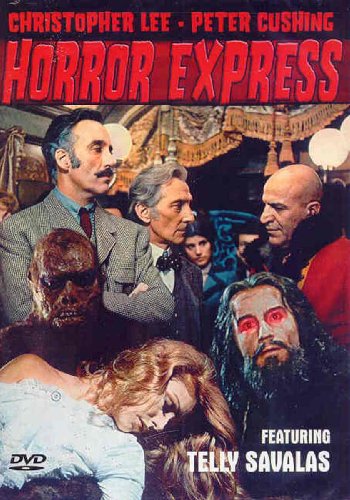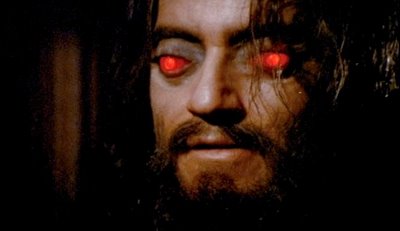“There’s a stink of hell on this train. Even the dog knows it!”
There are defining moments in every horror connoisseur’s life, movies which strike a chord or deliver a particularly memorable scare. Horror Express (1972) haunted me as a child, and I find as an adult that this cult favorite still brings the chills.
Show me a horror classic and I’ll show you a movie with excellent execution, regardless of the plot’s originality. Nothing particularly original happens in Horror Express, but everything is executed so well, from the conception of the beast, to the acting, effects, camera work, and music, that the movie achieves rank as a classic. Horror Express is an example of how a horror movie should be made – attention modern filmmakers.
The 1970s was a transformative period for horror cinema. The emergence of a more liberated cinematic culture, combined with the remnants of 1960s counterculture, led to an influx of boundary-pushing horror films. Directors and writers began experimenting with taboo themes, graphic violence, and overt sexuality, often wrapped in what can be termed “seedy horror.” Amid this backdrop, “Horror Express,” directed by Eugenio Martín, finds its place as a unique and unforgettable entry. It combines elements of British horror with the Spanish exploitation scene, while also tapping into themes from both American and European cinematic traditions.
An Homage to Classic Monster Films
At its heart, “Horror Express” is an homage to older, classic horror films, especially those featuring creatures and monsters. The plot revolves around an ancient, frozen humanoid creature that comes to life aboard the Trans-Siberian Express and starts killing passengers, absorbing their memories and knowledge in the process. While its premise may sound like a standard monster-on-the-loose narrative, the film’s setting—a claustrophobic, snow-swept train journey—gives it a unique atmospheric tension. Unlike many seedy horror films of the 70s that relied heavily on shock factor, “Horror Express” finds its terror in the confines of its setting and the inevitability of the looming threat.
Elements and Broader Implications
However, that’s not to say “Horror Express” entirely sidesteps the era’s seedy undercurrents. Its creature, with its power to drain memories and identities, can be interpreted as an allegory for fears of the era: the loss of individuality, the Cold War’s ideological assimilation, and the invasive nature of governmental surveillance. The glowing red eyes of the creature after it has absorbed someone’s memories is hauntingly reminiscent of the hypnotic allure of many dangers of the time, from political propaganda to the growing drug culture.
Furthermore, the film also taps into a sense of distrust in authority. Scientists, police, and even religious figures are rendered helpless or misguided in the face of the creature’s terror. This aligns well with the 1970s’ broader skepticism towards institutional authority, fueled by events like the Watergate scandal and various global political upheavals.
While “Horror Express” may not be as explicit or confrontational as many of its horror contemporaries, it undoubtedly captures the zeitgeist of its era. The film blends traditional horror elements with subtle nods to the societal fears of the 1970s, making it a unique and intriguing entry in a decade teeming with groundbreaking horror films.
The Movie
A horror’s who’s-who comprises the cast for Horror Express, including Christopher Lee, Peter Cushing, and yeah, Telly Savalas. Who loves ya, baby?
As for the plot, an anthropologist (Lee) discovers an ape-like monster frozen in the ice of Manchuria. Believing the monster might be the Missing Link, he transports the beast by train across Siberia, hoping to bring the Missing Link safely back to Europe. But after the ice thaws…
Cushing portrays Dr. Wells, a slippery fellow who bribes guards to get the monster’s crate onto the train. Wells manages to make a mess of quite a few things in between wooing women. Cushing appears to greatly enjoy his role here, showing his range as a gifted actor.
Utilizing the unique setting of a trans-Siberian express train, Horror Express generates a claustrophobic atmosphere, exploited by the skills of director Eugenio Martin. Dark lighting is effectively employed throughout, enhancing the creepiness of the ambiance.
Even more than The Exorcist, the beast aboard the train made me believe in (and fear) evil. There is something so inherently evil about the monster that it still makes me shudder.
Its malevolence is accentuated not just by its appearance but by its method of killing. Those chilling, crimson eyes of its victims post-mortem serve as haunting evidence of its power to drain knowledge and life, leaving behind an eerie emptiness. The very idea that the beast doesn’t merely kill, but absorbs the essence of its victims, presents a form of terror that transcends the physical. It speaks to a fear deeper than death—the annihilation of one’s very identity, the erasure of memories, experiences, and emotions.
Furthermore, Telly Savalas’s role as Captain Kazan, albeit brief, brings an unexpected layer to the narrative. His rough, brutish character, with his over-the-top theatrics and cruelty, provides a jarring contrast to the silent, calculated menace of the creature. Savalas doesn’t arrive as Captain Kazan until the final act. But once he hits the screen as a Russian Cossack, he delivers a performance so powerful it is almost shocking. Arrogantly swilling vodka and ordering people around, you almost begin to believe Kazan will get the whole situation under control and lock the monster away in a Siberian prison. But things, as you might guess, are not so simple.
This juxtaposition cleverly insinuates the idea that evil is not just the domain of supernatural entities, but can manifest in the very human vices of power and authority. The final moments of the film leave a lasting impression, proving that “Horror Express” isn’t just another creature feature but a nuanced exploration of the nature of evil, both supernatural and human.
The effects are simple and effective – the monster drains thoughts from people’s minds, leaving them with blank, bleeding eyes. Watching the monster sway from side-to-side, with its victims following like puppets, is both mesmerizing and horrific. One of the most chilling scenes involves the mind melting of Father Pujardov, expertly played by Alberto de Mendoza. It’s one of those visions which sticks in your head long after the movie is over. Father Pujardov is a terrific character, stealing scene after scene, demanding your attention.
Another beautiful touch is a haunting whistled tune that the beast picks up from one of his victims. Hearing the song whistled through the train, knowing it is the monster, is disturbing.
Well-written, gory, and flat out scary, Horror Express is a true genre classic from the 1970s. If only they still made movies like this one.
You can get the Blu-ray/DVD combo of Horror Express through Amazon.



2 thoughts on “Horror Express 1972”
I’ve actually never seen this one before.
Unfortunately I can’t find it on Netflix streaming. The DVD is inexpensive, and this movie is absolutely worth having in your personal collection. 🙂